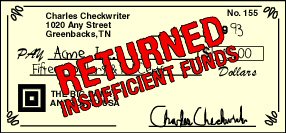|
Bad Checks
Remember the phrase, "Whip me, beat me, make me write bad checks"? Well, guess what - Kansas law makes it illegal to write a bad check. (The other mentioned activities are also of questionable legality.) There are conditions, of course, that have to apply. Here is a non-exclusive list:
First, in order to be guilty of the crime of giving a worthless check, you have to know it was bad at the time it was given. Second, the person who was given the check has to give the defendant notice that the check was bad and allow them seven days to make payment on the check plus a service fee not to exceed $30. Third, the person whom the check was given must not have been given notice the check would not clear the bank. Fourth, the check must not be presented to the bank for payment before the date on the check. If the check is presented before the payment date and the person knows the check is post-dated but turns it over for prosecution, then the check holder could be prosecuted per K.S.A. 21-3709 for causing an unlawful prosecution for a worthless check. This is a class A nonperson misdemeanor and is punishable by a year in the county jail and reimbursement of the costs of the wrongful prosecution. Fifth, the worthless check must have been a legitimate tender of payment due. So, if the check was stolen then that will negate criminal liability. If there is no dispute that the check was legitimate tender of payment due then a person can normally pay the amount due and have their case dismissed. The amount of the face value of the check will determine the maximum punishment for the crime of giving a worthless check. If the check is $25,000 or more than than the maximum prison term is 34 months. If more than one check is tendered within a seven day period and the total of the combined amounts is $25,000 or more than the maximum prison term is 34 months. If the amount of the worthless check is at least $1,000 but less than $25,000 than the maximum prison term is 17 months. The same prison term applies if more than one check is tendered within a seven day period and the combined total is at least $1,000 but less than $25,000. 
If the worthless check amount is less than $1,000 than the maximum penalty is 12 months in the county jail unless the same person has two or more prior convictions within the preceeding five years. Then the maximum penalty is a prison term of 17 months. The court may order restitution to be paid to the victim to reimburse their losses as a result of receiving a worthless check. Failure to make restitution could jeopardize a person's chance of remaining on any available probation.
|